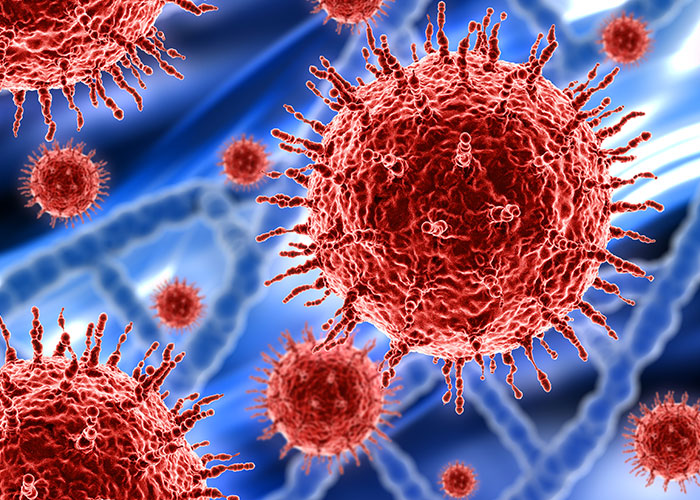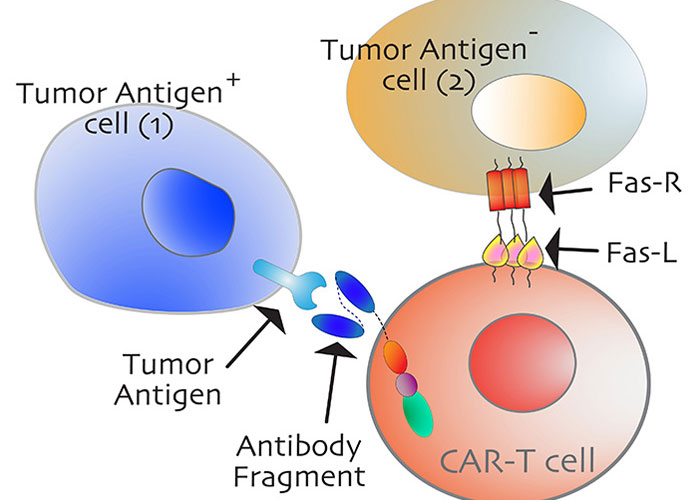Scientists have just discovered a way to kill off cancerous cells, a new process that could improve cancer treatment.
A research team from the University of California, Davis (UCD) Comprehensive Cancer Center has found a method to detonate the mechanism that leads to the heart of cancerous tumors.
In essence, the process consists of triggering a “timer bomb” on the cells that line a tumor’s associated blood vessels, Science Alert reported.
The result, which was published as a scientific paper Cell Death & Differentiation last month, demonstrated that the blood vessels in question control access to the tumor tissue.
Scientists have discovered a way to kill off cells, a new process that could improve cancer treatment

Until the blood vessels are opened, engineered immune cells can’t easily gain entry to the cancer to fight it off, as explained by Science Alert.
As such, the timer bomb on these cells is in fact a “death” receptor, reportedly called Fas (or CD95).
When these “kill switches” are activated by the right antibody, it triggers the programmed death of that cell, the website states.
UCD’s scientists and colleagues at Indiana University had argued that until recently, Fas had been “undervalued in cancer immunotherapy”.
The new method consists of a detonating mechanism that leads to the heart of cancerous tumors

Up until now, not one Fas antibody has made it to clinical trials, but recent experiments have changed this discourse.
New experiments have included the use of mouse models and human cell lines, as UCD scientists have at last identified specific antibodies that, when attached to Fas receptors, effectively trigger self-implosion, the publication explained.
Jogender Tushir-Singh, the immunologist and senior author of the study, said: “Previous efforts to target this receptor have been unsuccessful.
“But now that we’ve identified this epitope, there could be a therapeutic path forward to target Fas in tumors.”
“Kill switches” are activated by the right antibody, triggering the programmed death of a cell

As explained on the website, the antibody that binds to this epitope, which is a specific part of the death receptor, enacts as the kill switch for the cell.
Upon the immune checkpoint’s being blown open, additional cancer therapies, such as CAR-T therapy, can receive more access to their targets, which are often clumped together and hidden within the tumor.
According to Penn Medicine, CAR-T therapy works by programming a person’s own white blood cells, called T-cells, to bind to and attack specific types of cancerous cells.
But the downside to these programmed T-cells boils down to the fact that they usually cannot get past the “bystander” cells that lack the recognizable antigens usually used to target tumor cells.
Therefore, CAR-T therapy has been limited to treating blood cancers or leukemia, and can’t reportedly provide consistent success against solid tumors.
The therapy is believed to be much more effective against tumors

Jogender said: “These are often called cold tumors because immune cells simply cannot penetrate the microenvironments to provide a therapeutic effect.
“It doesn’t matter how well we engineer the immune receptor activating antibodies and T cells if they cannot get close to the tumor cells. Hence, we need to create spaces so T cells can infiltrate.”
Scientists have developed two engineered antibodies in newer UCD experiments.
These antibodies were found to be “supremely effective” at attaching to Fas receptors and causing bystander cells to self-implode.
The result was reportedly successfully achieved in ovarian cancer models and many other tumor cell lines tested in the lab.
The Fas ligand developed by the scientist was able to engage two critical parts of the Fas receptor, which researchers have reportedly suggested should be investigated further.
People were enthusiastic about the research

With the hopes that CAR-T cells could become engineered to target these receptor parts on bystander cells as well, the therapy could reportedly be much more effective against tumors.
Jogender further explained: “We should know a patient’s Fas status – particularly the mutations around the discovered epitope – before even considering giving them CAR-T.
“This is a definitive marker for bystander treatment efficacy of CAR-T therapy.
“But most importantly, this sets the stage to develop antibodies that activate Fas, selectively kill tumor cells, and potentially support CAR-T-cell therapy in solid tumors.”
Hopeful netizens shared their relief upon reading about the discovery















